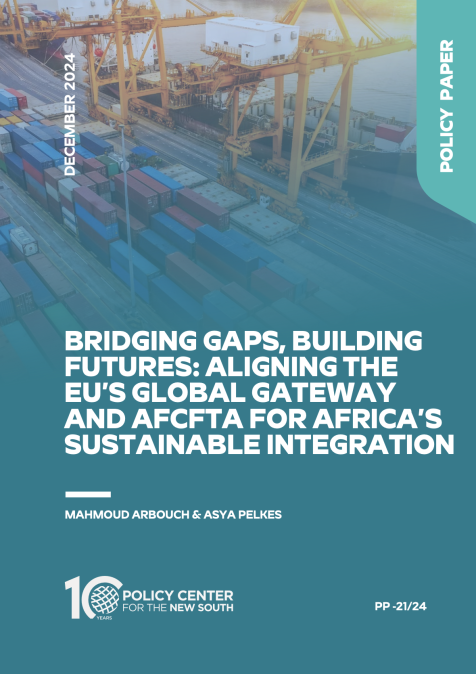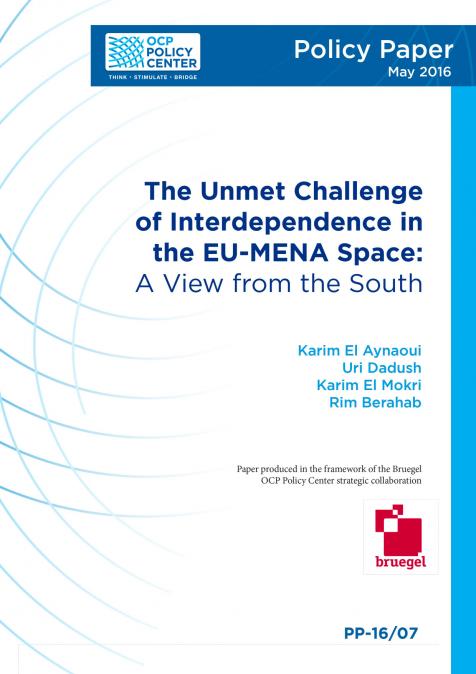Publications /
Opinion
Nowadays, links between development and security are widely recognized by many, just as they were during the development of the Marshall Plan. As mentioned in the United Nations "A More Secure World" report, threats to one are intrinsically a threat to all. Thus, 17 UN-agreed goals were agreed upon to help end poverty, protect the planet, and ensure prosperity for all by 2030, including goal 16 for "peaceful and inclusive societies".
Last month, the UN’s inaugural Africa Dialogue Series (ADS) focused on the nexus between peace, security, human rights, humanitarian assistance and development in Africa. Furthermore, focus was also put on the need to pay more attention to the Security-Development Nexus in Africa, which can be confirmed by the following observations:
1. The Organisation for Economic Co-operation and Development (OECD; French: Organisation de coopération et de développement économiques) reports that most African migrants in Europe are from the Horn of Africa and West Africa, and that they increased by about 1.4 million people between 2010 and 2013 with the median age being 29.9 years. Their movement is driven by conflict and poverty.
2. For the African Development Bank: “fragility is in fact a risk inherent in the development processes itself (not a category of states). Fragility comes about where pressures (e.g. growing populations, increased urbanization, youth unemployment, inequality and social exclusion, climate change, new natural resource finds or resource scarcity) become too great for countries to manage within the political and institutional process, creating a risk that conflict spills over into violence” (AfDB 2014, p. 9).
3. Currently, challenges in Africa remain substantial. In fact, according to the World Bank Africa poverty report entitled "Poverty in a Rising Africa" (2016), more people are poor than they were in 1990. To elaborate, the number of people living in extreme poverty has grown substantially even if poverty across the continent may be lower than what current estimates suggest, since the poverty rate fell from 56% in 1990 to 43% in 2012. The report added that because of population growth, many more people are poor. In addition, the United Nations estimates that by 2050, 86% of the world's population living in the extreme poverty will be concentrated in Sub-Saharan Africa.
In response to rising poverty and violence, many developed countries’ officials are calling for more support in human and economic development for disadvantaged societies throughout the world.
At the regional level, precisely alongside the EMA (Europe, Mediterranean, and Africa) axis, the European Union had previously highlighted the necessity of using an innovative approach with key players to achieve a security-development nexus. In her speech at the Munich Security Conference, Federica Mogherini, the EU’s Foreign Policy chief, has pointed out that : “[…] And, finally, I believe Europeans are understanding that investing in strong societies – and in strong societies, not in the illusion that a strong man – and always a man – makes a country stable -, in resilience, in human rights, democracy, good governance, jobs, education… investing in this, which is the European way, is also an investment in our security(…) It is not charity: investing in development, investing in the Sustainable Development Goals, investing in humanitarian [aid], is not charity. It is an investment, a selfish investment, in our security.”
In such a context, EU actions on the nexus of security and development at present are based on a range of instruments:
1 - Global Strategy: the EU's over-arching foreign policy and security strategy, agreed in 2016, which includes an "integrated approach to conflicts" as one of its five priorities.
2 - Communication on resilience in (June 2017) set out how to move from crisis containment to prevention.
3 - European consensus on development: A June 2017 agreement signed by all three EU institutions and 28 member-states, to help meet SDG's. Its primary aim is poverty eradication, but it links development to other policies, including peace, security, migration and climate change.
4 - European Development Fund (EDF): The EU's main fund for development aid, worth 30.5 € billion in 2014-2020. It is separate from the EU budget, and is financed directly by EU countries.
5 - European external investment plan: An 88 € billion fund for Africa and EU neighborhood set up in 2016 to tackle the root causes of migration.
Another step forward to achieve a security-development nexus is the "New European Consensus on development "Blueprint." The latter is a plan of action to eliminate poverty and achieve the 17 Sustainable Development Goals.
European leaders are committed in building strong links between the different elements necessary for sustainable development and security. However, there are many obstacles hampering these goals, and they must be overcome if the security development nexus is to become a reality.
Challenge 1:
Conflicting priorities between states and the international community can present difficulties. Often, promoting development and combating terrorism are in competition with each other, especially when it comes to aid allocations. For instance, in the Sahel Sahara region, the main priority of national government is to promote development, while the main concern of international assistance is to fight terrorist organizations and stop migration.
Challenge 2:
The main difficulty to be addressed is how governments can place the concerns of their citizens at the center of their policies. Many political leaders continue to manage their country primarily on tribal or regional bases paying little attention to shifting demographics and high rates of urbanization in an era of mass and fast communication.
Challenge 3:
There needs to be a better understanding in our collective consciousness that the concept of "Human Security" leads to a growing importance of more people-centered security, underlying the importance of empowering individuals and groups to benefit from growth and development. Beyond protecting them from conflicts and tensions, the main goal is to build their resilience to engage in development activities.
There is no doubt that development and poverty alleviation are crucial to a viable peace on the African continent. Only a comprehensive approach will make it possible to go beyond simply treating the symptoms towards tackling the root of security’s issues. More work and more opportunities represent Africa’s major goals for the 21st Century, and the challenges it must overcome.








